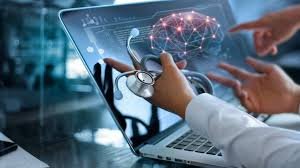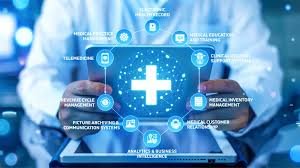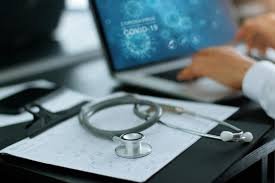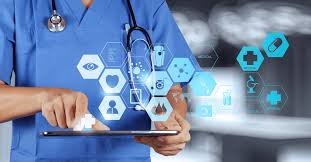Revolutionizing Patient Care: How Healthcare Software Is Changing The Industry
In the fast-evolving healthcare landscape, technology is playing a pivotal role in improving patient care and transforming the way healthcare systems operate. One of the most significant drivers of this transformation is healthcare software. With the increasing need for efficiency, accuracy, and accessibility, healthcare software is revolutionizing the industry by offering innovative solutions that enhance clinical workflows, improve patient outcomes, and streamline operations.
From electronic health records (EHR) and telemedicine platforms to artificial intelligence (AI)-driven diagnostic tools and remote patient monitoring systems, healthcare software is reshaping every facet of healthcare delivery. This article explores the diverse ways in which healthcare software is changing the industry, the benefits it brings, and the challenges and opportunities that lie ahead.
Key Takeaways
- Healthcare Software Enhances Patient Access: Telemedicine and remote monitoring tools have improved access to healthcare, especially for patients in rural areas or those with chronic conditions.
- AI Improves Diagnostics and Treatment: AI-driven tools are enhancing diagnostic accuracy and enabling personalized treatment plans that result in better patient outcomes.
- Operational Efficiency is Streamlined: Healthcare software automates administrative tasks, freeing up time for healthcare professionals and improving operational workflows.
- Patient Engagement is Empowered: Mobile health apps, wearable devices, and patient portals are giving patients more control over their health and improving communication with healthcare providers.
- Data Security and Compliance are Essential: Healthcare software solutions are designed with strong data security features to ensure the privacy and confidentiality of patient information.
The Role of Healthcare Software in Modern Healthcare

Healthcare software encompasses a wide range of digital solutions designed to address the complexities of managing patient care, medical data, and administrative tasks. These solutions are built to support healthcare professionals, enhance patient experiences, and optimize operational efficiencies. Some of the most influential healthcare software solutions include:
- Electronic Health Records (EHRs): EHRs are digital versions of patients’ paper charts, storing all relevant health information in a centralized, accessible location. They streamline patient data management, improve communication between healthcare providers, and reduce errors caused by paper-based records.
- Telemedicine Platforms: Telemedicine software allows healthcare providers to offer remote consultations and monitoring, providing patients with convenient access to care without the need for in-person visits. This is especially beneficial in rural or underserved areas where access to healthcare may be limited.
- Healthcare Management Software: These systems help hospitals, clinics, and medical offices streamline administrative processes, such as scheduling, billing, and resource management. By automating these tasks, healthcare management software allows healthcare providers to focus more on patient care.
- Clinical Decision Support Systems (CDSS): Powered by artificial intelligence and machine learning algorithms, CDSS assist healthcare professionals in making evidence-based decisions by providing real-time alerts, reminders, and recommendations. This reduces the likelihood of errors and ensures that patients receive the best possible care.
How Healthcare Software is Changing the Industry
The impact of healthcare software on patient care and the overall healthcare industry is profound. From improving care delivery to enhancing operational efficiencies, here are several key ways healthcare software is revolutionizing the industry:
Improving Patient Access to Care
Access to healthcare has long been a challenge, particularly in rural or underserved areas. Telemedicine software is breaking down geographical barriers by enabling patients to consult with healthcare providers remotely. This has proven especially beneficial during the COVID-19 pandemic, where in-person visits were limited, and the demand for virtual consultations soared.
- Convenience: Patients can now receive care from the comfort of their own homes, reducing travel time, wait times, and the burden of taking time off work or school.
- Expanded Access: Telemedicine expands access to specialists who may not be available locally, offering patients the ability to consult with top-tier experts remotely.
- Cost Efficiency: By reducing the need for in-person visits, telemedicine can lower healthcare costs for both patients and providers. It also allows healthcare professionals to manage their time more effectively.
Enhancing the Accuracy of Diagnoses and Treatment Plans
Healthcare software that utilizes AI and machine learning algorithms is revolutionizing how diagnoses are made and treatment plans are developed. For example, software tools can analyze medical images, such as X-rays, MRIs, and CT scans, to detect abnormalities and help doctors make more accurate diagnoses.
- AI-Powered Diagnostics: AI-driven diagnostic software is capable of identifying patterns and anomalies that human clinicians may miss. This leads to earlier detection of conditions such as cancer, heart disease, and neurological disorders, ultimately improving patient outcomes.
- Personalized Treatment Plans: By integrating patient data, including genetic information, lifestyle factors, and medical history, healthcare software can create personalized treatment plans that are more tailored to individual patients’ needs, increasing the likelihood of positive outcomes.
Streamlining Healthcare Operations
Healthcare software also plays a crucial role in improving operational efficiency within healthcare facilities. From patient scheduling and resource allocation to billing and insurance claims, software solutions automate and streamline these processes, freeing up valuable time for healthcare professionals to focus on patient care.
- Efficient Scheduling: Software tools can help patients schedule appointments with ease, reducing the likelihood of scheduling errors and cancellations. Automated reminders and confirmations ensure that appointments are kept, reducing no-show rates.
- Resource Management: Healthcare management software helps providers optimize resource utilization, ensuring that the right equipment, staff, and facilities are available when needed.
- Billing and Claims: Automated billing software reduces errors in billing and simplifies the claims process for insurance providers, speeding up reimbursements and improving financial stability for healthcare providers.
Empowering Patients Through Digital Health Tools
Patients are increasingly seeking more control over their healthcare, and healthcare software is helping them do just that. Mobile health apps, wearable devices, and patient portals allow individuals to track their health, monitor chronic conditions, and communicate with their healthcare providers more effectively.
- Mobile Health Apps: These apps allow patients to monitor their health metrics, such as blood pressure, glucose levels, and physical activity. Patients can share this data with their healthcare providers in real-time, enabling more personalized care.
- Wearable Devices: Wearable devices, such as fitness trackers and heart rate monitors, provide continuous monitoring of vital signs and health parameters. These devices can detect early signs of health issues and alert both the patient and the healthcare provider, allowing for early intervention.
- Patient Portals: Many healthcare providers offer online patient portals that allow patients to access their medical records, request prescriptions, schedule appointments, and communicate with their doctors. This increases patient engagement and satisfaction while improving care coordination.
Improving Data Security and Privacy
With the increasing digitalization of healthcare, patient data security and privacy have become paramount concerns. Healthcare software is continually evolving to ensure that patient data is securely stored, transmitted, and shared.
- Data Encryption: Modern healthcare software solutions encrypt patient data, ensuring that sensitive information is protected from unauthorized access.
- HIPAA Compliance: Healthcare software solutions are designed to comply with regulatory standards such as the Health Insurance Portability and Accountability Act (HIPAA), which mandates strict privacy and security measures for patient data.
- Blockchain Technology: Blockchain is emerging as a solution for ensuring the integrity and security of healthcare data, providing a transparent, tamper-proof way to store and share medical records.
Types Of Software Development In Healthcare

With the healthcare industry relying increasingly on data and technology, hospital software development will continue to be in high demand. In the following section, we’ll explore the different types of software development in healthcare that are evolving to satisfy the demands of an ever-changing industry.
Medical Practice Management Software
We all acknowledge the increasing need to provide cost-effective care. It is especially true in an era where the population is rising and people are living longer, so it’s essential to ensure our resources are spent as efficiently as possible.
The trend of analog to digital transformation has created a need for medical practice management software that can help doctors, nurses, and other care providers better manage their workflows.
Electronic Health Record Software
Healthcare providers are demanding better and more efficient software solutions to help improve patient care. Electronic Health Records (EHRs) and best emr for small practice can play an integral role in this process.
Electronic health record (EHR) software is a system that keeps track of a patient’s medical history and treatment. It can also be integrated to manage other aspects of the healthcare process, like billing and staffing.
For example, the implementation of EHRs has been shown to improve the quality of care by helping clinicians get a complete picture of their patients with just one click. In addition, these solutions can help reduce medical errors by making it easier for clinicians to access vital information at any given time and location.
Some EHRs are standalone systems with their databases, while others share information with other programs, such as laboratory or pharmacy management systems.
E-Prescribing Software
As the electronic medical records industry continues to grow, so does the need for E-Prescribing software.
These systems can also transmit medical records, lab test results, and other information. Additionally, e-prescribing software may include the ability to sign all documents electronically with digital signatures.
Electronic prescribing software has a lot of benefits, but it also comes with challenges, such as technical support and workflow challenges.
The approach is much more efficient than previous methods of filling prescriptions and reduces paperwork for pharmacies. Moreover, it allows pharmacists to access medication history without contacting the physician or waiting for an office visit.
With e-prescription software, pharmacists can also track what medications have been prescribed and when patients last took them.
Urgent Care
Smartphone adoption is rising, and many healthcare providers are now turning to digital platforms. Urgent care software is one of the more popular digital initiatives with several advantages over traditional methods.
These services are experiencing a significant rise in demand, and also the number of urgent care centers is increasing to meet the demand. It has created a need for urgent care software that can be accessed across multiple locations.
Urgent care software is useful for all staff members, from doctors and nurses to office staff and technicians. It should have features that allow for better communication with patients.
Mobile apps and web-based systems enable patients to take advantage of digital appointment scheduling, extended hours, and remote monitoring.
Hospital Management Software
A hospital management software is a system that automates a hospital’s or other healthcare facility’s administrative and clinical processes.
Hospital management software streamlines workflows, increases productivity, reduces errors, improves data quality, and increases patient safety. With its implementation, hospitals can focus more on providing care to patients and managing their facilities rather than manually managing paperwork and updating records.
The software can be configured as a stand-alone or integrated system with other hospital systems and functions such as registration, billing, lab management, and reporting.
The software collects data from various sources, including patient records and financials. This data is then processed by algorithms to generate analytics that enables staff to make better quality improvement and cost reduction decisions.
Healthcare CRM
Creating a software package to streamline your company’s workflow is an excellent way to enhance productivity and provide your clients with a better experience. An example of this type of software would be a CRM system, which is intended to keep track of customer information and interactions.
It enables healthcare providers to gain more insight into who their customers are, what they need, and how they can be helped.
Leveraging the power of a Healthcare CRM makes the healthcare industry more efficient and effective – staff can better coordinate all aspects of their jobs, from scheduling appointments to following up with patients. Eventually, they are less likely to forget important details or steps.
A brief healthcare history

The first software that changed the shape of the healthcare industry was EHR software. From 1990 onwards, the data privacy regulations urged IT vendors to come up with innovative software solutions that could provide enhanced security for PHI. These two events were significant milestones in the history of the healthcare software industry.
Here’s the healthcare record-keeping history in a nut-shell;
- 1920s – detailed record keeping of patient care
- 1928 – ACOS established AHIMA, which created standard practices for keeping medical records
- 1965 – medicare social program
- 1967 – HELP Health Evaluation through Logical Programming
- 1972 – first EHR but costly
- Late 1980s – widespread use of EHRs
- 1996 – HIPAA law by Bill Clinton
- 2009 – HITECH by Barack Obama
From the record-keeping efforts in the 1920s to the adoption of EHR technology in the 1980s to the recent upsurge of telehealth software during COVID-19, the healthcare software industry has constantly evolved to meet the ever-changing needs of doctors, patients, and hospitals.
The significance of software in revolutionizing healthcare
The software is changing conventional methods and generating solutions for longstanding problems in the healthcare sector. It influences operational efficiency, patient empowerment, and predictive analytics. It means that for a change in the healthcare industry, this impact makes it a must-have tool.
Here’s a detailed insight into some key reasons that highlight the importance of software in healthcare:
Patient Contentment
Software for healthcare has replaced traditional methods consisting of time-consuming manual efforts. It has automated scheduling of online consultations to manage medical records. Patients can access healthcare services in mere moments from their own homes using customized portals.
Physicians can generate electronic prescriptions, making it easier for patients to receive their treatment with reduced risk of human error. But that’s not all. Patients can easily send online feedback by utilizing the interface of software for clinical use. This feedback allows doctors to address patients’ concerns and identify areas of improvement.
Efficient management
The process of keeping track of medical equipment and pharmaceuticals is likely to get more complicated in the coming years. Healthcare facilities can effectively address this problem by using custom software for hospitals.
Inventory and maintenance schedules are easily managed in real time using medical software. It makes the hospital’s day-to-day task management easier and lowers the expense of resources. In the end, hospitals can avoid delays and provide high-quality care.
Reduced paperwork
Medical software can drastically reduce the need for paper-based documents. The manual recording of patient data is time-consuming and tiring and poses a high possibility of security breaches. Health software provides an effective method for collecting patient information while also allowing the secure transfer of the PHI (Protected Health Information).
Benefits of healthcare software

There are several benefits of using custom-developed clinical software. They support not only individual practitioners but also the working of healthcare organizations and hospitals at a broader level. AR & VR are further innovating the healthcare industry.
Let’s have a look at the benefits of medical software for all three parties: doctors, patients, and organizations:
Benefits for doctors
Here’s how healthcare software helps doctors;
- The latest diagnostic tools can help doctors assess the onset of ailments or diagnose existing diseases more accurately.
- By utilizing telehealth software, doctors can deliver remote patient care and consultation for patients who cannot visit onsite.
- Having instant access to patient health records helps doctors understand patients’ history even if they have been treated elsewhere earlier.
- Some medical software supports physicians’ decision-making by analyzing patient data and offering substantial recommendations.
- By signing up for online collaborative platforms, doctors can keep themselves updated by attending virtual webinars, accessing medical research studies, and networking with peers.
- AI-based software assists healthcare practitioners in creating personalized treatment plans for patients.
Benefits for patients
Here’s how healthcare software creates ease for patients;
- Many healthcare software offer educational resources where patients can learn about various diseases and treatments and tips and guides to make better decisions regarding their health concerns.
- Automated billing and payment options relieve patients’ financial stress as they can efficiently manage their treatment costs.
- Reminders and alerts can help patients better manage their medication routine, resulting in positive outcomes.
- Patients can monitor their progress by using health-tracking apps, setting goals, and staying motivated by achieving various milestones determined by the software.
- Patients can avail of online consultations and provide instant feedback without the need to leave home.
Benefits for organizations
Here’s how healthcare software facilitates organizations;
- The top benefit of using healthcare software for organizations is reduced costs.
- Healthcare organizations become more efficient by delivering error-free and timely software services.
- As most software is developed keeping the cybersecurity landscape in view, it helps organizations secure sensitive patient data from external threats.
- Incorporating medical software in the infrastructure helps organizations scale their operations without compromising the quality of services.
- Healthcare software assists in data-driven decision-making by offering unique insights and stats.
- Using software can improve patient satisfaction through efficient communication, quick treatment, and hassle-free payment options.
Also Read : The Future Of Healthcare Agencies: Innovating Patient Care And Service Delivery
Conclusion
Healthcare software is revolutionizing the healthcare industry by providing innovative solutions that enhance patient care, streamline operations, and improve overall healthcare delivery. With the integration of AI, telemedicine, mobile health tools, and secure data management systems, healthcare software is driving efficiencies and improving patient outcomes across the globe.
As technology continues to evolve, healthcare software will remain at the forefront of the healthcare transformation, enabling healthcare providers to deliver more personalized, efficient, and accessible care to patients. However, as with any technological innovation, there are challenges to address, including data security concerns, system integration, and the need for proper training. By addressing these challenges, the healthcare industry can unlock the full potential of healthcare software and ensure that patients receive the best possible care.
FAQs
What is healthcare software?
Healthcare software refers to digital tools and platforms used by healthcare professionals and organizations to manage patient care, streamline operations, and improve overall healthcare delivery. Examples include EHRs, telemedicine platforms, and clinical decision support systems.
How does telemedicine software improve patient care?
Telemedicine software enables healthcare providers to consult with patients remotely, reducing the need for in-person visits. This improves access to care, especially for individuals in rural areas or those with mobility issues, and allows for more convenient, cost-effective healthcare.
What are the benefits of AI in healthcare software?
AI in healthcare software can analyze large datasets to assist with diagnosis, predict health outcomes, personalize treatment plans, and provide real-time decision support to clinicians, ultimately improving the accuracy and efficiency of patient care.
How does healthcare software enhance operational efficiency?
Healthcare software automates administrative tasks such as patient scheduling, billing, and claims management, allowing healthcare professionals to focus on patient care. It also helps optimize resource allocation and reduces the potential for human error in everyday tasks.
Are healthcare software solutions secure?
Yes, modern healthcare software solutions are designed with robust security features, such as data encryption and compliance with regulatory standards like HIPAA, to ensure the privacy and security of patient information.
How can healthcare software improve patient engagement?
Healthcare software empowers patients by providing them with tools to monitor their health, access their medical records, schedule appointments, and communicate with their healthcare providers, increasing patient engagement and satisfaction.
What are the challenges of implementing healthcare software?
Challenges may include high upfront costs, training healthcare staff to use the software effectively, and ensuring integration with existing systems. There may also be concerns about data security and patient privacy.
